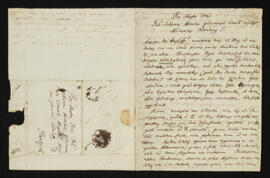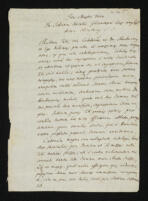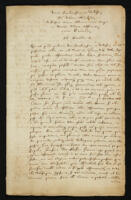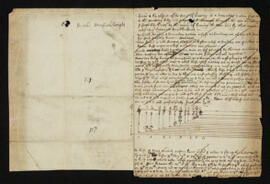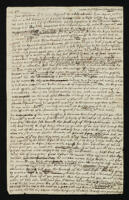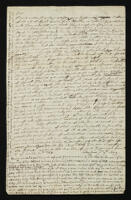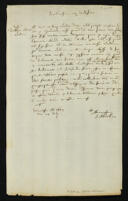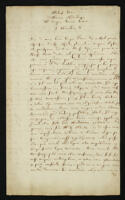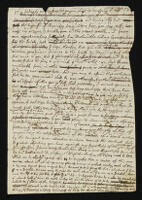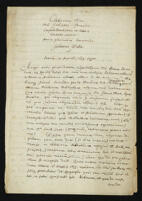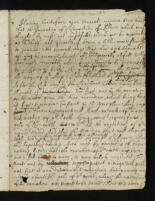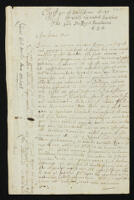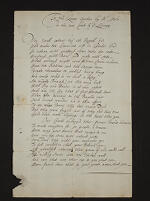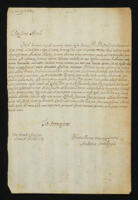Extracted from Sraffa 2542-3
Accompanied by folded sheet enclosure with MS biographical note on Bernard.
Sans titreSee the table of contents below. On the spine is stamped ‘The Glasse of Righteousness by H. Nichol of the family of Love. M.S.S. Anno M. D. LXXX.’
—————
Contents
f. i r: Title: ‘The Glasse of Righteousnes. (Speculum Justitiae) Through the holy Spirit of the Love of Jesus Christ and the deified Man, out of the Heavenly truth witnessed and published. To a declareing the Headsumme of the Upright Righteousnes or Kingly crowne of the Everlasting life. And is by HN perused anew and playnely or Distinctly declared. Translated out of Base-almayne. … ANNO. M. D. LXXX.’
f. 1v: Print of a symbolic representation of the Last Judgement, headed, in Low German, ‘Nu geit idt Gerichte ŏuer de Werlt: nu wert de Fŏrste desser Werlt vth-geworpen. Joan. 12.’ (John xii. 31). 1590 x 1630.
The illustration depicts, in the words of the British Museum catalogue, ‘an angel hovering above two large orbs; a devil and skeleton standing on the right orb as it is swallowed by a hell mouth [with a lamb in front]; at left the same orb upturned, crushing the devil, the lamb with the flag of the resurrection standing on top of the fallen skeleton’. The angel carries a label inscribed ‘Nu is idt Heil de Kraft, vnde idt Ryck vnserem Gode geworden vnde de Macht Synem Christo Apoc 12’ (Rev. xii. 10). The lambs are each labelled ‘De Wech de Waerheit vnde idt Leuen’ (‘The Way, the Truth, and the Life’); the devils are each labelled ‘Sunde’ (‘Sin’).
Cf. British Museum No. 1870,0514.311.
f. 5r: ‘The First Booke. of the Glasse of Righteousnes.’
At the foot of the page is the date 1578.
f. 77r: Print of a symbolic representation of God in Heaven, 1656.
Engraved by Richard Gaywood. The print depicts a sun with the tetragrammaton in the centre, surrounded by clouds and a heavenly host. At the head is the text ‘Ego primus et ego novissimus: alpha et omega Is. 44.48. Ap.1.21.22’, and round the sun is ‘Coronae assimilabo judicium meum. 4.Esd.5.’ This is an elaboration of the device which appears on the title-page of several of Niclaes’s books, e.g. The Prophetie of the Spirit of Love (1574).
f. 78r: ‘The Second Booke of the Glasse of Righteousnes.’
f. 201r: ‘The Third Booke of the Glasse of Righteousnes.’
f. 295r: ‘The Tree of Life | The Fourth Booke of the Glasse of Righteousnes.’
f. 403r: Print of a heart and other emblems, captioned with verses beginning ‘Our Heart is the Minde of God’, 17th c.
Two hands clasped in greeting in front of a lily, within a heart surrounded by rays of light, clouds, and winged heads. Above the hands are the words ‘Love trueth’, and amidst the clouds are the tetragrammaton and the word ‘Emmanuel’. Below the illustration are the following verses: ‘Our Heart is the Minde of God most high. Our Beeing amiable, as the sweet Lillie. Our faitfullnes Love and Trueth upright, Is Gods Light. life, and Cleernes bright.’
Pera, Constant[ino]politanae - After an apology for the long delay in writing to the Fellowship, Barrow gives an account of his travels from Paris, with a description of his stay in Florence, prolonged because of the plague in Naples, which was predicted to spread to Rome whither he had planned to go next; heeding the warning that if caught by the plague he would not be able to leave, and it proving too difficult to reach Venice, he embarks on a ship to Constantinople. He describes the present state of affairs under the Grand Vizier, Koprulu Mehmed Pasha, who had come to power two years earlier: his work to restore the Ottoman name at home and abroad, recovering the islands of Tenedos and Lemnos, repelling an attack by the Venetian fleet, suppressing a revolt in Moldavia and Wallachia by removing their princes, repressing the infighting threatening the prestige of the empire, most recently undertaking an expedition to Transylvania on the pretext that Prince Ragotzy, a Turkish subject, had invaded Poland hoping to take the kingdom for himself. Barrow predicts that Christendom will find in the Grand Vizier its worst enemy and describes his punishment of Parthenius, the Patriarch of the Greek Church, who was accused of intrigue with the Duke of Muscovy despite the commonly held view that the accusations were false, and who was hanged and left on display in his Pontifical robes as a deterrent to plotters. Barrow closes with a promise to return to Cambridge within the year.
Docketed by William Derham, "Paper. 1. Dr Barrows Lr ...to the Fellows of Trin. Col. Cambridge from Constantinople. Caland August 1658. Publ. Lr 1. W.Ds.'
Sans titre(‘In Petty's list of his own writings … the entry “Verbum Sapienti, and the value of People” stands opposite the year 1665, and the internal evidence makes it probable that the booklet was written in the latter part of that year.’ (The Economic Writings of Sir William Petty, ed. C. H. Hull (1899), vol. i.))
Note about James Duport pasted to the inside front cover. Notes headed 'G. E. H. Grigson Esq., Pelynt, Looe, Cornwall' tipped in at beginning of book: 'A commonplace book in a late 17th cent: hand or early 18th, by an undergrad: or fellow of Trinity College...', records extent and condition of book before listing contents. Note at the bottom [in the hand of A. F. Scholfield, Librarian?]: 'Bought for £1. ? Apr. 1927'.
pp. 1-15 (pp. 5-6 excised): 'Rules to be observed by young Pupils & Schollers in the University', concluding 'The End of Mr Duports Rules. Ann. dom. 1660'
pp. 16-18: 'Animadversions upon the Election of Fellowes in Trin: Coll. Ann dom: 1656.' English verses.
pp. 18-22: 'In electionem Socioru[m] Trin: Coll.Anno 1658.' Latin verses on the election of fellows to Trinity.
pp. 22[-23 or 24]: 'A Relation of a Quaker, that to the shame of his profession attempted to bugger a mare neere Colchester Anno 1658.' English verses. Most of the tile, from 'to the shame' to 'Anno', crossed out in later hand. Four verses only; the leaf containing the rest has been excised.
pp. 25-28: 'Verses made upon the election of Fellows T.C. 1659.' English verses.
pp. 31-33: 'The hunting of the Hare.' English verses.
pp. 33-49: 'Oratio M[agist]ri Linnet, habita in Collegio SStae & Individuae Trinit: cu[m] Primarij lectoris officiu[m] exorsus est.' Latin prose. Text of oration delivered by William Lynnet at Trinity at the beginning of his term as Head Lecturer, Oct. 1656.
pp. 50-73: 'Oratio habita in Collegio SStae Trin Cantab: circa annum 1654 die quinto Novembris in conspirationem Anglicanam. Authore M[agist]ro Ramsy ejusde[m] Collegii quonda[m] Socio.' Latin prose. Oration delivered by John Ramsey c 1654, ' about the Anglican [English] conspiracy of the fifth day of November [the Gunpowder Plot].
p. 74: Transcription of lines from Isaac Watt's 'How does the little busy bee...', published 1715, in childish hand.
'Walter Godfrey's' written in pencil on last page; there is a discussion in Preston & Oswald (2011) as to whether the original owner may have been Walter Godfrey, matriculated 1661 but did not graduate.
Endorsements on verso of last sheet: 'Ag[ain]st Newton of Light'; in another hand, 'L[ette]rs between Hook & Newton abt Colours'; 'V.64'; N.P'.
Regarding the eclipse of the sun observed in Gdansk on the morning of Thursday 11 Jun. 1676 by Hevelius.
The sheet labelled '11A' has the annotations 'Hook's Musick Scripts', '101', and 'NP'.
Endorsed with date and note, 'His Hypothesis about the Attraction & moving of the Heavenly Bodies'.
Endorsed with date and note, 'Of Æquation of Times & Tables of it in divers'.
Endorsed 'Dr Hooks Proposals to the K[ing] for his watches with 2 Balances finding Longitude' (A-N) and 'first Proposals abt the Longitude' (P-T).
Poem addressed to Queen Catherine of Braganza on the occasion of the visit by Catherine and Charles II to Trinity to view the structure of the Wren Library, then being erected. Title as it appears is 'To the Queen spoken by Mr Duke in the new Court by ye Liberary [sic]'. First line, 'You equall partner in the Royall bed...'
Sans titre
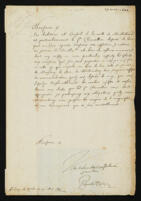
![Letter from Oliver Cromwell to the Master of Trinity [Thomas Hill]](/uploads/r/trinity-college-library/6/5/3/653a761be359523ffef4bcee5241302461ab17ac75cde8d8bcff527f00b29dac/O.11a.1.3_thumb.jpg)
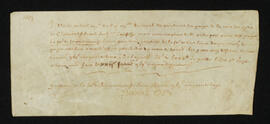


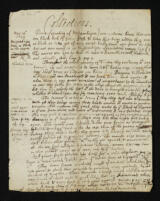
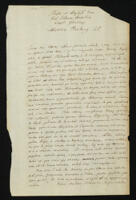

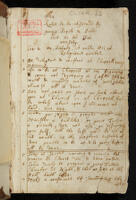
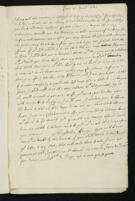
![Draft of letter from Robert Hooke to [?] William Brouncker, 2nd Viscount Brouncker](/uploads/r/trinity-college-library/5/0/c/50ca79f4a65c5d25f88697611dd4433bcfd92a1b0732d4668ab7f7ec394e670d/O.11a.1.6_thumb.jpg)
![Answer by Isaac Newton to Robert Hooke [re comments upon his doctrine of light and colours]](/uploads/r/trinity-college-library/8/d/1/8d18a9bf7f546032e792cd150a89da245dc50180ce02d08b8d6e5afbab61119d/O.11a.1.60_thumb.jpg)
